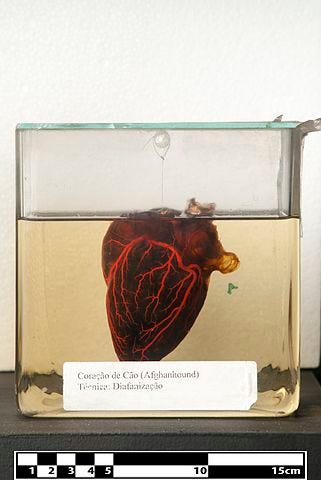Pacemaker no longer needed? Can you donate it to a dog?
Even with a 10-15-year shelf life for pacemakers, vets, schools and CanPacers' views on human pacemaker donations are mixed

When I heard a dog whimpering by my side, I looked toward the two dogs strolling down the street next to their owners. Neither dog looked all that interested in the dog I was walking (at that moment anyway). I turned to look the other way and didn’t see any other dogs. Surely it wasn’t the dog on the other end of my soft-padded leash, the same dog who froze and immediately darted away from any dogs we saw on our occasional walks since I joined Wag! in 2019. This dog was about as antisocial as dogs could get.
ADVERTISEMENT ~ Amazon
As an Amazon Affiliate, I earn a percentage from purchases using my referral links.
But there he was. He was whimpering to get around me and play with these two unfamiliar dogs who were four times larger than him, and I was too confused to stop him. They checked each other out. I made eye contact with the owners to make sure it was cool to step closer. After a few sniffs, they were done with each other and I buzzed the door so the pet owner could let me in. That was still on my mind as I climbed the steps.
I had to ask the dog owner, “What changed?”
She smiled and said, “The pacemaker.”
ADVERTISEMENT ~ Amazon
As an Amazon affiliate, I earn a percentage from purchases with my referral links. I know some consumers are choosing to boycott Amazon for its DEI removal. However, after thinking about this thoroughly, I choose to continue promoting intriguing products from small businesses, women-owned businesses and (specifically) Black-owned businesses who still feature their items on Amazon. All five of my Substack publications now include a MINIMUM of one product sold by a Black-owned business. (I have visited the seller’s official site, not just the Amazon Black-owned logo, to verify this.) If you still choose to boycott, I 100% respect that decision.
It turned out that this dog, who would’ve run away from dog parks and acted frightened around any loud noises, had gone from the shy dog at the party to the life of the party as soon as he got a pacemaker. It wasn’t a personality issue; it was a health issue. I felt like I was walking a brand new dog, who was socializing with everybody after wanting to be around very few for the first few years of him being a regular four-legged client of mine.
So when I saw the Yahoo! Life post about the Akita breeder who encouraged humans who no longer need pacemakers to pass them onto dogs, I was intrigued. According to the Cleveland Clinic, pacemakers nowadays can last as long as 10 or 15 years (the same amount of time as a small dog breed). But how would a human’s pacemaker help a dog?







